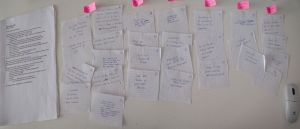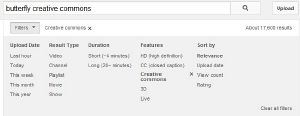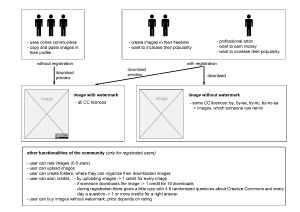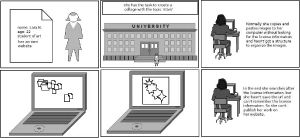Design Goal
In the beginning it was hard for us to define a design goal, because we knew only a little about Creative Commons. The interviews and also the research in the internet helped us to concretize our design goal more and more. During the course we have defined some, e.g.
- How can we make it easier for persons to use Creative Commons licenses?
- How can we make it faster and more efficient for persons to find contents with a Creative Commons license?
Finally we decided us for this one: How can we make it easier for artists to find and organize images of Creative Commons?
User Research
We were looking for arguments for and against Creative Commons on the internet and we conducted some interviews.
Interviews
- our criteria for selecting the interview participants was that people publish something on-line
- we knew all people personally and so we also knew, that they publish something on-line
- it was difficult to find people and specially professional artists, because you can't find very easy, who use Creative Commons and who not, if you don't know the interview participants
- we asked some pre-formulated questions and also some other during the interview
- pre-formulated questions were:
- Do you know Creative Commons? If yes, from where do you know it? In which way do you use it or why do you not use it?
- How do you license your works?
- questions during the interview were, e.g.:
- Where have you downloaded the images?
- Where do you publish your works?
- this questions were depending on the situation
- persons, who we have interviewed face-to-face:
- computer science student with facebook-account
- computer science and media student with facebook- and deviantart-account; she paints in her free time and publishes some scientific results to her university website; she corrected grammar and orthography in wikipedia articles
- media student with facebook-account; he also works as a dj
- business student with a facebook-account; she photographs in her free time
- web designer
- we recorded the interviews and made to ourselves a few written notes
Analysis
Problems we identified
- some people have never heard Creative Commons or they knew little about it
- anti Gema movement, wikipedia
- not all people have the same level of familiarity with CC licenses, but mostly people, who earn money with creating images or music, have more experience with that
- people didn't use Creative Commons or they unconsciously use it
- example: Somebody writes an article or something else in wikipedia, but don't recognize that wikipedia stands under Creative Commons license.
- people didn't know something of Creative Commons filter, which can be used for searching with google, youtube, ...
- people saved images on the computer, but after a while they forgot the place, where the image was downloaded
- they don't save any extra information (license, author, ...)
We identified the following motivations and goals of users
- people don't want to search long after the license information
- they want a plain overview of the licenses
- if they remix contents, they want to be sure of using the licenses in the right way
- they want to see at the first glance which contents are good or bad
We identified the following important activities
- people look for content to a central place
- for pictures: google, deviantart
- for scientific papers: google
- for source code: google, sprut - site with source code to programming a compiler (German website)
- for videos: youtube,vimeo
- for music: soundcloud, youtube
- first they create their work and afterwards they look after the license
- the most community user copy and paste images to their profile without looking for license
- people share their own works under the German copyright
- sometimes people make a bookmark in the browser to find again contents later
Ideas
1. TRADING PLACE FOR IMAGES
The trading place for images should help that less people copy and paste images without looking for license of them and the registered users can trade some special images among themselves. Also they can rate and organize the uploaded images.
We make a distinction between non-registered and registered users, because they have different demands. Non-registered users want to copy and paste easily images without looking to the license. If they can download the image only with watermark, so they have the advantage, that they don't break any law. And also the registered users can profit from it, because their copyright will be seen very fast.
Registered users can also rate and organize the uploaded images in a special workspace, so that they can find easier, where the image was downloaded. So they see at the first glance, which authors they must be refer, if they mix different pictures with a Creative Commons license.
In this way the idea solves a lot of problems, which we identified during the interviews. On the one hand it solves the problem, that people don't simply copy images and publish them without calling the author and the license, because the people must not search long after the license information. Besides the users have a central place, where they can search after images very easy and fast and we hope, that people deal more with Creative Commons licenses in this way.
The big problem of our solution is, that users do not want to pay credits for pictures without watermark, if they can download it without watermark elsewhere (e.g. flickr).
Why are current solutions unable to support users in this?
Existing solutions in this section (e.g. flickr) haven't got the advantage, that users can download the image with watermark, so that they don't search after the license information. Mostly artists don't edit Image-Metadata-Formats like ITCP and so it is difficult to remember the correct license and the author and our idea solves this problem through watermark or with the workspace area. Also we concentrate us to spread the Creative Commons thought and so the users can trade, but they can't buy with money. For that reason the users can find only images with Creative Commons license in the community. Other existing solutions gives the choice to use CC-license or the normal copyright.
2. IMAGE MANAGEMENT PROGRAM
User can search pictures with CC license (flickr, google, ...) with the program and they can also structure and save them. Additional information (license, author, source, ...) of the image is stored locally on the computer and the user can decide to copy and paste an image with or without watermark.
This idea solves the problem, that people forget the place, where they downloaded the image or who was the author and people have a central place, where they can sort, manage and download images.
Image Management Program More In Detail
Scenarios
situation without our program
situation with our program
Anna L. is a student of art and she wants to make a collage with the topic 'endlessness' for a study project. For this she wants to use pictures with a Creative Commons license, because she wants to publish her work also on her website, where she have a portfolio. So she opens the image manager program and chooses the directory, where the data will be saved. Afterwards she creates a new search- and workspace-tab and searches for 'endlessness' there. She wants only images with the license 'by' and so she selects in the filter-menu the suitable checkbox. When she finds one image, she looks the picture in full size. If it has a good quality she drag and drop it in one workspace-folder. If she has enough pictures, she goes in the workspace-area and there she manages her images. She arranges and rates the pictures, because she wants to see easily, which images are the best ones and after this she copies and pastes her favorites in a photo-manipulation-program, where she creates a collage. After she finishes her work, she looks after the license again in the image management program, where she can easily copy with one click the license-information. In the end she uploads her collage and pastes the license-information on her website.
Prototypes And Prototyping
Low-Fidelity-Prototype
First paper-mock-up for the second idea:













